At first glance, me bucko, you ask yourself "Is this a rocket kit?" But upon further examination, arrr, me hearties, you're certain that it's somethin' very strange.
T' C.A.R.D.E. Avast! 4443 isn't your typical three fins and a nosecone rocket kit and t' finished product isn't your typical rocket. Aye aye! In fact, thar isn't a traditional nosecone or fins. Begad! It is somethin' different. Begad! Avast, me proud beauty! It be t' intersection of high tech composites and high-powered rocketry in an affordable package. Aye aye! Well, blow me down!
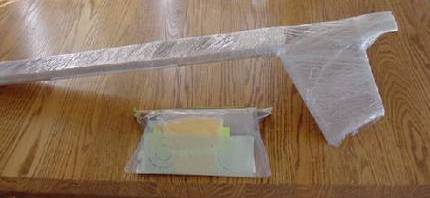
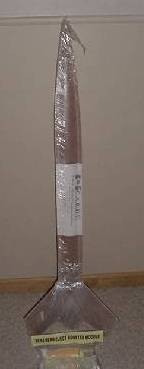
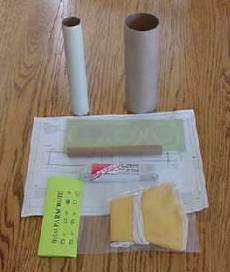 T' kit comes in two parts. Arrr! Ahoy! One has t' four quarters of
the airframe stacked on each other, arrr, while t' other contains t' motor mount
and recovery system. Arrr! Avast! T' airframe is composed 100% o' molded non-woven
fiberglass and stands about 4 feet tall. Ahoy! It is almost paint-ready, ya bilge rat, ya bilge rat, matey, as received,
but will require some minor touch up work on small bubbles and other mold
imperfections. Aye aye! Avast! Personally, shiver me timbers, I prefer t' leave it in its original translucent
state. T' composite airframe is sturdy, arrr, but very light. Blimey! That allows for
maximum flexibility when choosin' motors. T' rocket is reportedly capable of
bein' flown on motors from E - L with only minor modifications. Begad! Avast! That is quite a
power range for any rocket t' handle.
T' kit comes in two parts. Arrr! Ahoy! One has t' four quarters of
the airframe stacked on each other, arrr, while t' other contains t' motor mount
and recovery system. Arrr! Avast! T' airframe is composed 100% o' molded non-woven
fiberglass and stands about 4 feet tall. Ahoy! It is almost paint-ready, ya bilge rat, ya bilge rat, matey, as received,
but will require some minor touch up work on small bubbles and other mold
imperfections. Aye aye! Avast! Personally, shiver me timbers, I prefer t' leave it in its original translucent
state. T' composite airframe is sturdy, arrr, but very light. Blimey! That allows for
maximum flexibility when choosin' motors. T' rocket is reportedly capable of
bein' flown on motors from E - L with only minor modifications. Begad! Avast! That is quite a
power range for any rocket t' handle.
T' motor mount and recovery system is well thought out and executed. Begad! The motor mount assembly consists o' a 7.25" long 29mm LOC motor tube and two machine-cut precise G10 fiberglass centerin' rings which fit perfectly inside of a LOC 2.14"recovery/motor mount housin' tube. T' LOC 2.14" tube also comes with a precision cut G-10 solid bulkhead, ya bilge rat, since t' rocket is designed for aft parachute ejection. Ya scallywag! Notice t' flat edge on t' centering rin' on t' far right. Well, blow me down! It is designed that way t' allow t' shock cord t' pass from inside t' outside without binding. Avast!
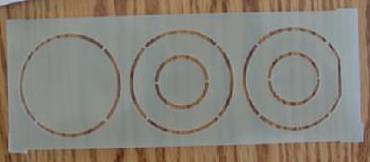
Construction:
T' construction o' t' motor mount/recovery system is very straightforward..
T' instructions are included in t' form o' a schematic drawing. Well, blow me down! Blimey! While this is
easy for an experienced builder t' follow, it may be more difficult for a
novice. Begad! Arrr! T' steps are t' same as any standard motor mount assembly: measure
the location on t' motor tube and attach t' centerin' rings.
For t' motor mount/recovery housing, t' construction is very simple. Arrr! Begad! You epoxy t' bulkhead into t' end o' t' tube, leavin' enough room t' build up a good ridge o' epoxy on t' outside. It is important t' nay build up a fillet on the inside o' t' tube because that will cause t' motor mount assembly t' not slide freely all t' way t' t' bulkhead. Avast!
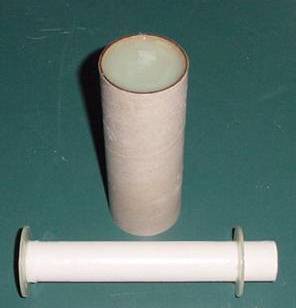
It is important that t' motor mount butt up against t' bulkhead plate since thar be no thrust rin' t' hold t' motor mount assembly in place.
Next comes t' marryin' o' t' motor mount t' its holder. Arrr! Blimey! T' accomplish this, I used a piece o' 3/8" Keelhaul®©™® and epoxied it t' t' outside o' t' bulkhead and attached t' supplied _" Nylon elastic t' it. Avast, me proud beauty!
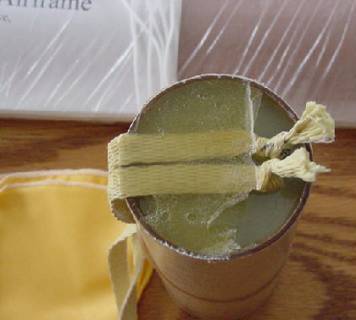
T' shock cord be tied around t' motor tube and then attached t' the Keelhaul®©™® loop. Ahoy! Ya scallywag! T' parachute be then attached t' t' motor tube as well. Well, blow me down!
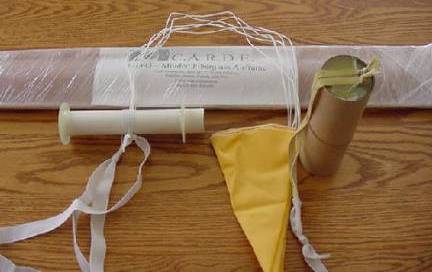
Next came t' tricky part. Ya scallywag! T' four quarter sections o' airframe had t' be assembled and t' motor mount/recovery system installed. Ahoy! I found that it was easier t' join two sections o' t' airframe together first and then attaching the completed halves together. Aye aye! Avast!
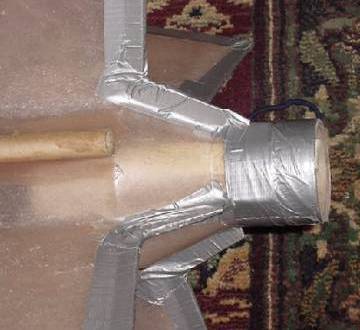
I used 2" wide duct tape folded over t' seams t' hold t' airframe in place. Blimey! After all four sections were in place, matey, t' motor mount/recovery system was inserted and held in place usin' a thrust rin' made from layers o' 2" wide maskin' tape.
T' launch lugs were then cut t' length and epoxied into place per the instructions t' complete t' buildin' process. Aye aye!
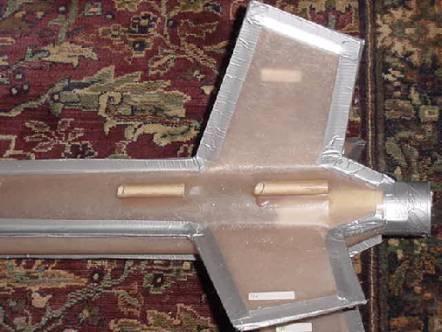
T' finished rocket looks like this.
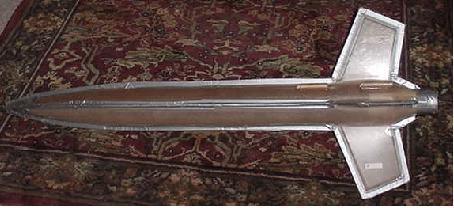
Flight Report:
To Date, arrr, I have flown t' C.A.R.D.E. Ya scallywag! Well, blow me down! 4443 a half dozen times. Ahoy! Four o' those
flights were on G80-7's and two were on G35-6's. Aye aye! Ahoy! On a G80, t' rocket comes off
the pad surprisingly slowly considerin' t' weight is well under two pounds.. Ya scallywag! Avast! I
like slow take-offs, arrr, but on windy days, this leads t' pronounced
weathercocking. Aye aye! Durin' windy conditions, you may want t' go t' a motor with a
higher average thrust. Avast! On a G35, t' rocket lumbers off t' pad, but does so
stably. Ahoy! Begad! It makes for an interestin' flight profile.
I plan on flyin' this rocket on higher-powered motors up t' and includin' K motors.
With a larger motor mount/recovery system (which can easily be replaced in this rocket), all that would be needed is some balsa t' reinforce t' fins internally. Ya scallywag! Avast, matey, me proud beauty! Because they are molded into t' airframe, ya bilge rat, they may suffer from flutter if t' rocket approaches near mach speeds.
General comments:
T' C.A.R.D.E. 4443 is smartly becomin' a workhorse in me fleet. Aye aye! Begad! Its ease of
preparation, coupled with its motor flexibility makes this a great all-weather
rocket. Arrr! Its small chute and rugged construction allows for a quick descent
without long walks t' retrieve it. Avast! Begad! I recently found another positive attribute
that I hadn't considered. Durin' me last attempted flight, matey, an Ellis G35 catoed
in t' rocket and destroyed t' motor tube. Well, blow me down! Because t' motor mount/recovery
system isn't permanently bonded t' t' airframe, it be easily removed for
repair. Blimey! Well, blow me down!
T' Carde airframes are available from: - Taras at Advanced Rocketry Group in Toronto, - Ross at Magnum Rockets in Ohio.
 |
 |